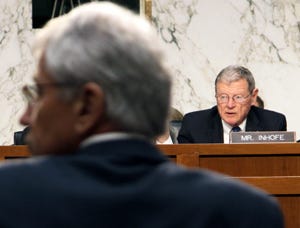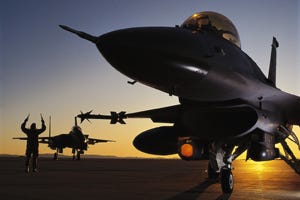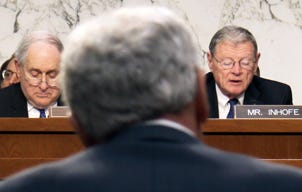Sen. Inhofe on defense authorization

Sen. Jim Inhofe (R-OK) Updated: U.S. Sen. Jim Inhofe (R-Okla.), ranking member of the Senate Armed Services Committee (SASC), today delivered the following opening statement at the SASC full committee hearing entitled: "Defense Authorization for Fiscal Year 2015 and the Future Years Defense Programs". As prepared for delivery: Events across the Middle East, Africa, and most recently in Ukraine have brought into sharp focus a reality that President Obama seems unwilling to accept: the tide of war is not receding. Instead, U.S. national security is being challenged in ways that I haven’t seen in all of my years serving in Washington.

During a recent congressional delegation trip through Africa, Europe, and Afghanistan, I met with our troops, diplomats, and foreign partners. They all made clear that the global security environment they’re facing is as volatile and complex as any time in recent memory and growing more dangerous by the day. Vladimir Putin’s abrupt invasion of Ukraine last week only underscores this troubling reality. Director Clapper, the Director of National Intelligence, told this committee in February that: (quote) “Looking back over my now more than half a century in intelligence, I've not experienced a time when we've been beset by more crises and threats around the globe.”

Sen. Jim Inhofe, ranking member of Senate Armed Services Committee, and Secretary of Defense Chuck Hagel look at a chart Inhofe references. Yet, this Administration’s misguided budget priorities are robbing our military men and women of the tools they need to defend the nation against growing threats. At a time when our national intelligence experts tell us that we face the most diverse, complex, and potentially damaging threats to our national security in recent history, we are poised to slash defense budgets by over a trillion dollars during this decade. The results of these cuts have been devastating to our national security. The Navy is at a historically low level of ships, our Air Force is the smallest in history, and the ground force may fall to its lowest level since before World War II. Readiness levels of remaining forces are plummeting and commanders now use the term “hollow” to describe their ability to defend the nation. Last October General Odierno said he had only 2 brigade combat teams, out of over 40, that were ready for combat.

For as long as I can remember, the American people have expected the men and women of their military to be the best trained and best equipped fighting force in the world, able to overwhelm any adversary at any time. Misplaced spending priorities are forcing this distinction to slowly slip from our grasp. Secretary Hagel; you just last week stated: “American dominance on the seas, in the skies, and in space can no longer be taken for granted.” Frank Kendall, your undersecretary of defense for acquisition and technology, said: “the U.S. military's technological superiority is being "challenged in ways that I have not seen for decades.”

Sen. Inhofe delivers his opening statement Wednesday at a Senate Armed Services Committee hearing while Secretary of Defense Chuck Hagel awaits his turn to testify before the committee on the FY'15 defense budget. Some in this town have accepted that gutting our military is necessary to rein in our growing debt. They couldn’t be more wrong. Defense spending isn’t what’s driving our debt crisis. Runaway entitlement spending is the real driver of our exploding national debt.
The reality is that defense spending accounts for only about 16 percent of annual federal spending, while entitlement spending accounts for more than 60 percent—and consuming more and more every year.
Over the last five years, the President has repeatedly chosen to ignore the facts. Not once during his time in office has the President put forward a budget that proposes any meaningful reform to entitlement spending. Instead, he’s consistently demonstrated that politics takes priority over getting our fiscal house in order, and far too often, it’s our military men and women who are paying the price. This year’s budget is no different. In fact, the so called “Opportunities, Growth and Security initiative” continues this troubling trend. It holds necessary resources for our military that could be used to begin rebuilding readiness and capabilities hostage for more domestic spending and higher taxes. It’s irresponsible. What’s being done to our military isn’t new. We’ve made this mistake before. The military drawdowns of the 1970s and 1990s were budget-driven follies intended to realize a peace dividend that proved short-lived. It left the country with a military too small to meet the instability and rising threats of a dangerous world. And each time, we didn’t realize the folly of these decisions until it was too late.

Today, our forces are now being asked to do more with less training, less equipment and ultimately less capability. This budget lacks a realistic assessment of the increased risk on the battlefield, and the increased risk our service men and women are being forced to make. And, as I’ve always said: risk equals lives. Our hearing today is an opportunity to evaluate this strategy versus resources mismatch. It is an opportunity to better understand what specifics we as a nation may no longer be able to call upon our military to accomplish.



